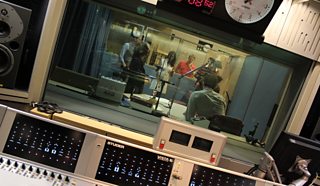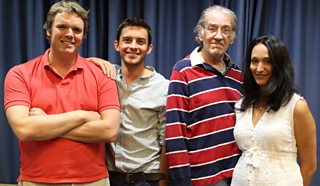
As one of its readers it’s a nice feeling to be able to contribute something to the Writersroom Blog. I hope some of this might be useful just as I hope it’s not too stultifyingly self-indulgent. I thought I might write a bit about my experiences of writing for radio, couched more widely in a bigger picture of my near constant struggle to try to find the right story to tell. What I’m not going to do is write a list of dos and don’ts for radio. Other much smarter people have done that, like .
I’m here because I’ve written a new play that will be broadcast on at 10pm on September 21st called . Radio 3 have been making a short season of plays and docs about ‘time’ and invited me to make a contribution. What I’ve written is a response to one of the other plays in the season, JB Priestley’s . Whilst Priestley’s play is about the philosophy of time, my play is about the physics of time (physics is a subject very close to my heart). It’s a love triangle between three physicists over the course of the second half of the twentieth century. Given that high energy particle physics is about recreating the energies present at the beginning of the universe it’s sort of about time machines…have a listen because I'd really like people to be directed to listen to the play.
I love writing radio. But it’s a new love. If I'm honest, when I started out writing at the end of university I didn't really know radio drama very well. Yeah, growing up I'd heard the Archers playing in my dad's workshop and I'd heard a friend's copy of Hitchhiker's but I'd never consciously tuned-in to radio drama. I’d written a stage play about the history of the atom bomb that (the now ex-Auntie but ever-avuncular) Paul Ashton to see. He gave me an enormous amount of support, encouragement and advice, and suggested various ways I might be able to develop stories for the �鶹Լ��. One of the ways was radio. After Paul's advice I got stuck in and discovered I had missed out on the most wonderful medium of all. It's the most flexible place to tell stories, you can go anywhere, make anything, build whatever universe you like and you'll never have a producer tell you a location or point of view's impossible. I realised I was looking into creative heaven but I didn't know how to enter.
��
The first radio play I wrote was a straight adaptation of one of my stage plays (coincidentally called) . It was commissioned as an Afternoon Play and it was a monologue I’d done for the Fringe about a batch of radio waves crossing the universe. The idea was that fifty light years away an audience was listening to the cosmos and they just happened to catch the ham-radio broadcast made in the 1950s by an American boy daydreaming about becoming an astronaut. I liked that electromagnetic waves (pretty much) travel forever through a vacuum and I got hooked on the idea that history is a property of light. Whilst it went ok on the radio, it suffered from not having radio (as medium) at its heart. Also, monologues, I discovered, are better in a theatre than on the radio. It also struggled because I was trying to cram a whole stage play into 45 minutes. Best avoid that! If you’re story’s 90 minutes in your head, don’t pitch it for half that slot time on radio!

Promo image for 'Radio' by Al Smith
Radio is tough. The relationship you have with your audience is more intimate than with any of the other form. It’s just you and them. If your story’s wonky they’ll sniff it out and switch off. Risk offending them at your peril (they’re vocal!). I felt I had done a suboptimal job on Radio and I wanted to find something more radio-esque for round 2. I buried myself in the medium. I listened to everything, trying to get to grips with what would sound good. In the very early hours of one night I heard a totally magic story on the “From Our Own Correspondent” strand of the World Service about a rural Cote d’Ivoirean post office worker who had been called up to serve in the government’s forces during that country’s civil war. Five years later he was discharged from his service and returned to his provincial town where he reopened his mailroom to discover a bag of letters that had never been delivered. The story was heartbreaking. He went about delivering these five-year-old time-bombs to his local community and watched as his fellow locals discovered all the history they’d missed out on. Around that time I was invited away to Bore Place by the Writersroom to think up ideas for Woman’s Hour, so I pitched it immediately pitched it and was fortunate to have it commissioned. I was proud of that piece and I felt it was good for radio because it was stuffed to the gills with interesting West African sounds (thanks to Sally, my miracle-worker producer), but I had this nagging suspicion that I was cheating at writing. I felt like I was doing an impression of what the audience wanted to hear (Alexander McCall Smith was at the height of his popularity at the time and I fancied emulating his style) rather than writing what I wanted to write. But I didn’t know what to write…how are you meant to know?
��
I backed off from radio a bit and buried myself in TV. I really wanted to get good at radio but I didn’t know what kind of story to tell. My mentor John had given me a bit of a grilling on a TV project I was working on. I was smug because I thought I’d written something really clever and good but he gutpunched me by telling me it was all brain and no heart. You know when someone just nails you with one note? That. There really is nothing worse than being told you’re wrong by someone who’s right. Ouch. He knows I hate thinking about feelings. Yuck. Go away. His note was compounded one night by a trip to the Royal Court…it was one of those playwriting advice evening things and an audience member put her hand up and asked “how do I know what story to write”. The advice she received really struck me as awesome and terrifying…Find your itch. Your itch is your voice. Scratching that itch is your play. I blanched. How the heck do you do that? I don’t know myself at all! I actively do my best not to know myself. Aargh!? WHERE SHOULD I SCRATCH?!?! AM I EVEN ITCHY AT ALL!?!? I really stewed on that.
��
Hmm. Still no new ideas for radio. Nothing that felt honest. I’d been going through a pretty tough time at home. My mum had just died and I was doing my best to put my dad back together. I felt like all my stories were either impressions of other writers’ better work, or smartypants and boring. I met up with Sally (my therapist / radio producer) and told her glumly that I wasn’t itchy at all and that my nails were all filed down from too much hopeful scratching. She asked me how dad was and I told her he was fine because mum had left loads of food for him to eat for after she died. She poked: Your mum left your Dad food? Yes, for all of us. Your mum cooked food for her family to eat knowing that she was going to die?! Yes, food was our glue. She didn’t want us to drift apart. Write that down, she said. What? That. What followed was another Woman’s Hour series called and it was very closely based on my family. Every episode was a new meal. It was hard to write. I cried a lot. It was uncomfortable writing about something so close to home, but it wrote itself because there was one hell of an itch there. That itch was about abandonment and having your emotional wheels ripped off. Cheery. There was nothing clever about any of it. It was just a story about grief and food and trying to thaw your heart out after death freezes it over. It was raw but I feel relatively confident that it was good radio drama (the audience can be very blunt if your piece doesn’t work, but can make you feel so brilliant if they enjoyed it).

Cast of Life in the Freezer: Al Smith, Jonathan Bailey, David Warner, Sian Clifford
And so to this new piece. Everyday Time Machines. I hope this one has the right blend of heart and brain. It has been fun to return to physics. But I also hope it has a big itch in the middle of it. What’s the itch? This itch in this one is about not feeling you’re good enough to have a good idea. I stuck that right in the protagonist’s gut and everything else spins out of that. Everyone feels like a fraud sometimes, right? Also, I suppose I wrote it in an attempt to impress my dad (he’s a theoretical physicist and knows this subject extremely well!). I hope it’s a good story. Good luck with your writing. Hope you’re itchy."
Drama on 3: by Al Smith is broadcast on �鶹Լ�� Radio 3 on Sunday 21 September at 10pm, as part of a collection of programmes looking at the concept of time.
If you are��interested in writing for Radio see details��for ��
��
